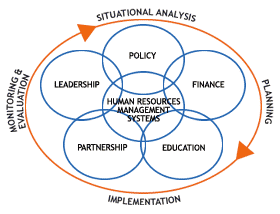
Partnership
Areas of Intervention
- Mechanisms and processes for multi-stakeholder cooperation (inter-ministerial committees, health worker advisory groups, observatories, donor coordination groups).
- Public-private sector agreements
- Community involvement in care, treatment and governance of health services.
Indicators
- Mechanisms in place for coordination (e.g., other key ministries, donors, service providers including private sector providers, professional associations, etc.)
- Agreements in place between MOH and other health providers
- Mechanisms in place to involve communities in health services.
Tools and Guidelines
Addressing the Health Workforce Crisis: A Toolkit for Health Professional Advocates Health Workforce Advocacy Initiative of the Global Health Workforce Alliance.
Guidelines for Forming and Sustaining Human Resources for Health Stakeholder Leadership Groups. CapacityPlus, 2011
Partnership Building: Practical Tools to Help You Create, Strengthen, Assess and Manage Your Partnership or Alliance More Productively. Capacity Project, 2007.
Resources
Ethiopia’s Health Extension Program: Improving Health through Community Involvement. 2011
Global Partnerships: Strengthening Human Resources for Health Approaches Together. The Capacity Project, 2009
Managing Partnerships. World Health Organization, 2008.
Mobilizing Local Resources to Support Health Programs. The Manager, Management Sciences for Health (MSH), 2002.
Network-Based Social Capital and Capacity-Building Programs: An Example from Ethiopia. 2010
Public Stewardship of Private Providers in Mixed Health Systems. Institutes for Development, Rockefeller Foundation, 2009
Strengthening Health Professional Associations. The Capacity Project, 2007.
Using Collaborative Approaches to Reach Human Resources for Health (HRH) Goals. Capacity Project, 2006.
